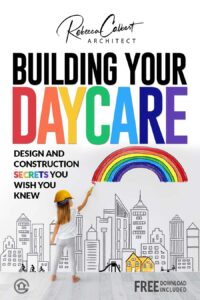Early Childhood Role Playing.
Children naturally turn to role-playing to become someone or something else.
It stimulates their imagination and encourages friendship through cooperation, listening and taking turns.
Mini playhouses like this one fit well into the inside of a large playroom for great entertainment when the weather is bad.
-This article was written by Rebecca Calbert.
Rebecca is a licensed architect with over 30 years of experience. She owns and operates an architectural firm, Calbert Design Group, and educates her clients through the commercial real estate development process with online content at SaveOnBuilding.com. Rebecca’s “purpose” is to educate small business owners and protect them from what they don’t know.


